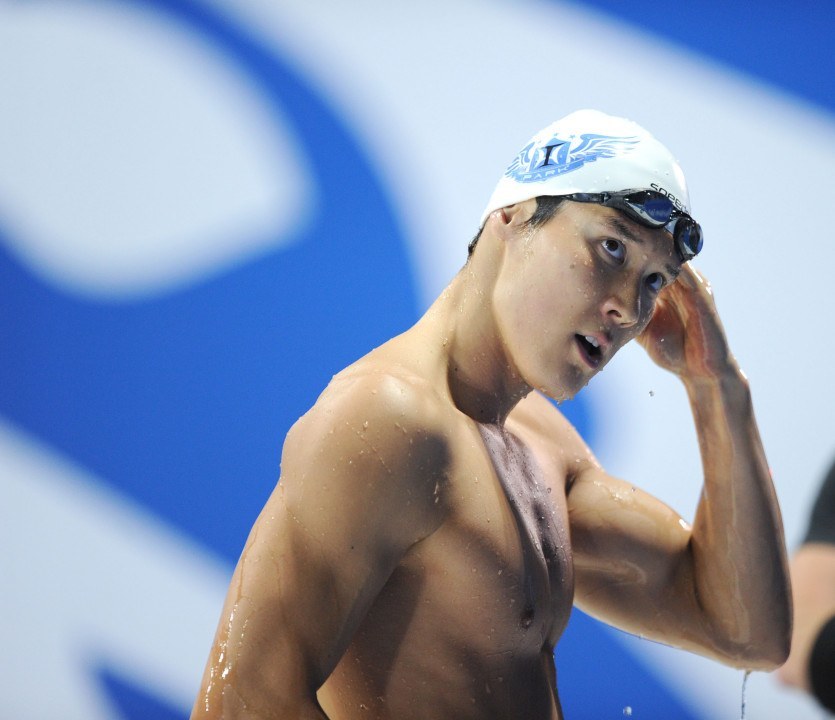South Korean swimmer Park Tae-Hwan has asked the Court of Arbitration for Sport (CAS) to begin arbitration proceedings after attempted mediation with the Korean Olympic Committee (KOC) has failed.
Park, a four-time Olympic medalist who won the 400 free at the 2008 Games, finished serving an 18-month doping suspension in early March for the banned substance Testosterone, which he claims he was injected with unbeknownst to him by his chiropractor.
The Korean Olympic Committee, however, has tacked on an additional punishment to the 18-month suspension and ruled him out of national teams (including the Olympic Team) for 3 years after the suspension ends.
Park, believed to be the first South Korean subjected to this rule, requested mediation with the Korean Olympic Committee, via the Court of Arbitration for Sport. This highlights the two types of services the CAS provides – mediation, where a mutual agreement between the opposing parties is attempted; and arbitration, where an independent arbitrator rules on a disagreement between the opposing parties.
After the former failed, Park is now requesting the latter.
“And if the KOC fails to respond to a decision by the CAS, we would file a lawsuit in South Korean court,” Park’s lawyers said in a statement.
“We’ve decided not to amend the protocol,” Han Jong Hee said after a meeting with the KOC Board of Directors. “The spirit of this protocol is to make sure that national athletes be armed with high morality.
“Doping runs against the spirit of fair play and it must be sternly dealt with, especially for the sake of educating young athletes.”
While the idea of an Olympic ban for convicted dopers has been popular among the sporting public, a similar rule has previously been struck-down by the CAS when the IOC tried to install its “Rule 45” or the “Osaka Rule.” That rule stated that any athlete who was suspended for more than 6 months for a doping violation would be ineligible for the next Olympic Games. The CAS, however, ruled that by making such a rule unilaterally, the IOC was violating a clause of the World Anti-Doping Code with regard to not allowing a double sanction for a single doping offense.
The IOC argued that the Olympic ban was not an additional sanction, but instead an ‘eligibility issue,’ but the CAS disagreed.
The World Anti-Doping Code is signed by the IOC as well as most of the world’s sports governing bodies, and at the time the CAS said that they didn’t necessarily think the rule was a bad idea, but that if it were going to be enacted, it would have to be done through an amendment of the World Anti-Doping Code, which it has not been.
Park, one of the biggest sporting stars in South Korea, holds 4 Olympic medals – gold in the 400 free from the Beijing Olympics, and silvers in the 200 free in Beijing, the 200 free in London, and the 400 free in London. He’s also a two-time World Champion, 6-time Asian Games Champion, and 4-time Pan Pacific Championships gold medalist.

Are we to really believe that Park’s chiropractor injected him with testosterone? How ridiculous!
Isnt the deal with Park that he already did the time and wants the extra punishment tacked on by south Korea lifted? Is he claiming innocence at this point?
Irish Ringer – while I believe he still maintains ignorance of the injection, he’s no longer disputing that matter with his appeals. He’s instead, as you said, fighting the extra punishment tacked on by the KOC.
Braden: if you were the Roger Goodell of swimming, and you had the power to allow just one of the following pair of swimmers go to Rio (and force the other one to stay home), whom would you choose to swim:
Park Te-Hwan
Julia Efimova
Throw in Jessica Hardy
Based on the information currently available, I believe that Park is the more likely of the two to win his arbitration, now that Efimova has confirmed that her positive Meldonium tests went into March, not just January.
Park’s situation seems to have a fairly clear precedent set by the previous CAS ruling, and I’m not aware of any change to the World Anti-Doping Code in the latest version that would impact that Osaka Rule decision.
I ‘d put the odds of Park being successful after a CAS hearing at about 70% and the korean olympic committee would likely acquiesce and name him to their team. It would be face saving for the KOC as the CAS would be the ones with their hands dirty. Yulia’s odds of being successful are about 5%. Should be 0% but i’m leaving the door open b/c there could be facts none of us know yet. The polyester suit crowd who run Russian high performance sport have no credibility left and I can’t imagine any objective ruling body or individual siding in Efimova’s favor.